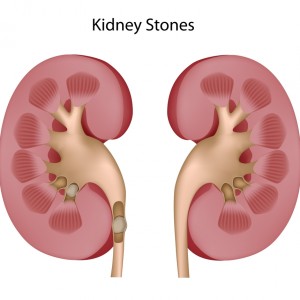 A recent study entitled “Vascular Calcification and Bone Mineral Density in Recurrent Kidney Stone Formers” suggests kidney stone formers have higher levels of calcification in their abdominal aorta, a possible mechanism for their higher risk of heart disease. The study was published in the journal Clinical Journal of the American Society of Nephrology (CJASN).
A recent study entitled “Vascular Calcification and Bone Mineral Density in Recurrent Kidney Stone Formers” suggests kidney stone formers have higher levels of calcification in their abdominal aorta, a possible mechanism for their higher risk of heart disease. The study was published in the journal Clinical Journal of the American Society of Nephrology (CJASN).
Kidney stones are a somewhat common condition of the urinary tract that occurs when certain chemicals clump together, forming a stone mostly made of calcium and oxalate. The process of kidney stone formation is designated as nephrolithiasis. Notably, increasing evidence suggests an association between nephrolithiasis and a higher risk for cardiovascular disease. The deposition of calcium in blood vessels – vascular calcification – is highly associated with cardiovascular disease mortality. Therefore, in this study a team of researchers at the University College London Medical School, UK and Shaare Zedek Medical Center, in Israel, together with colleagues at other institutions determined whether calcium kidney stone formers exhibit higher levels of vascular calcification.
The researchers analyzed a total of 111 patients, where 57 were kidney stone formers and 54 were healthy controls. The level of calcification of both abdominal aortic calcification (AAC) and vertebral bone mineral density (BMD) was analyzed by computed tomography (CT) imaging. The authors found that indeed kidney stone formers had higher levels of calcification in the abdominal aorta, when compared with age and sex-matched healthy controls. Additionally, the team found that kidney stone formers also had increase bone demineralization. This is suggestive of a possible correlation between vascular calcification and bone mass loss. Interestingly, this hypothesis was already suggested in other studies. However, the authors emphasize that additional studies have to be performed to confirm the aforementioned hypothesis.
In conclusion, the study findings suggest that indeed people with kidney stones have higher levels of calcification in their abdominal aorta, therefore, leading to an increased risk for cardiovascular disease.
Linda Shavit, MD and study first author commented in a press release, “Our findings raise several important questions that may be relevant to the care of patients with kidney stones,” said Dr. Shavit. “Existing CT can be a useful tool for assessment of aortic calcification and osteoporosis, along with kidney stone number and distribution. Moreover, preliminary experimental and clinical evidence suggests that therapeutic strategies aimed to treat osteoporosis may have a favorable effect on vascular calcification.”


